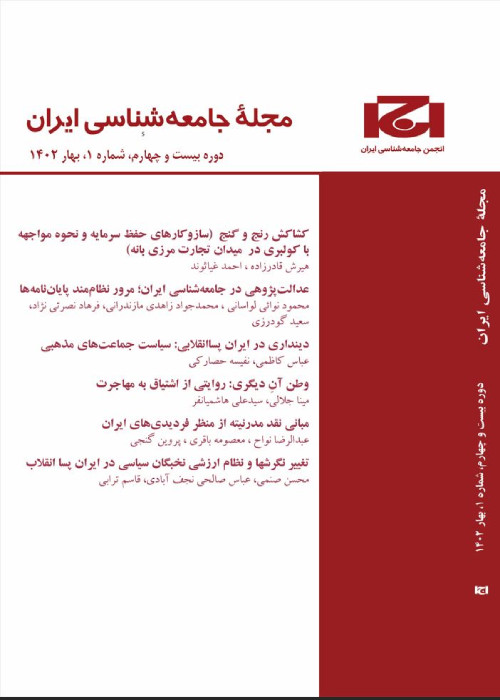The Meaning Reconstruction of Modernization Consequences in Ouraman, A Region of Iranian Kurdistan, (based on the Grounded Theory Study)
Author(s):
Abstract:
This study aims to explore the meaning reconstruction of modernization's consequences in ouramanat-e-Takht of Iranian Kurdistan. Interpretive approach was used as conceptual framework to explain the various aspects of inquiry. The interpretive approach presupposes that human actors consciously and reflexively react to their social environment based on their interpretation and evaluation in everyday life. In contrast to positivist approach in which the social reality is assumen to be fixed and preexisting, the interpretive approach defines social realities as flexible and free floating; also, it considers human beings as creatore and interpreters of their lives. Using interpretive approach, it has been tried to focus on modernization consequences in Ouramanat Region of Iranian kurdistan.Ouraman-e-Takht is a rural, dry and highly mountainous region located in southwest of Kurdistan province of Iran. Traditionally, the socio-economic structure of the region was based on limited farming, herding, gardening, and manual labor. Recently, some modern elements, including of new economic activities, modern education, modern health services, technology, communication and transportation possibilities and so on, have been introduced to the region. the purpose of this study was to explore, from the Ouraman perspective, the impact that modernization consequences have had on the Ouraman traditional way of life. In this respect, the modernization consequences were classified into ten dimensions consisting of economy, social stratification, education, health, religion, technology, communication/transportation, language, kinship, and social interaction. Data were collected over a period of nine months using ethnographic methods including observation, interviwe, videotaping, and photography. Data were analyzed using Grounded Theory Methodology. 56 participants were interviewed and various sorts of data were gathered. Ten core category constructed along with its respective paradigm model for each aspect of the modernization consequences; these core categories were: subsistence Improvement, Emancipation, Enabling/Constraining, Enhancing life Expectancy, Surviving the principles, Welfaremaking/Challenging, Facilitation,
Language:
Persian
Published:
Iranian Journal of Sociology, Volume:9 Issue: 1, 2008
Pages:
3 to 33
magiran.com/p690298
دانلود و مطالعه متن این مقاله با یکی از روشهای زیر امکان پذیر است:
اشتراک شخصی
با عضویت و پرداخت آنلاین حق اشتراک یکساله به مبلغ 1,390,000ريال میتوانید 70 عنوان مطلب دانلود کنید!
اشتراک سازمانی
به کتابخانه دانشگاه یا محل کار خود پیشنهاد کنید تا اشتراک سازمانی این پایگاه را برای دسترسی نامحدود همه کاربران به متن مطالب تهیه نمایند!
توجه!
- حق عضویت دریافتی صرف حمایت از نشریات عضو و نگهداری، تکمیل و توسعه مگیران میشود.
- پرداخت حق اشتراک و دانلود مقالات اجازه بازنشر آن در سایر رسانههای چاپی و دیجیتال را به کاربر نمیدهد.
In order to view content subscription is required
Personal subscription
Subscribe magiran.com for 70 € euros via PayPal and download 70 articles during a year.
Organization subscription
Please contact us to subscribe your university or library for unlimited access!


